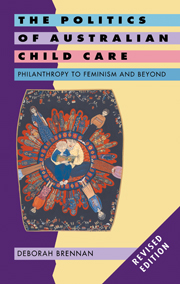Book contents
- Frontmatter
- Contents
- List of tables
- Acknowledgements
- List of abbreviations
- Preface to the Revised Edition
- Introduction: Women, the State and the Politics of Caring for Children
- 1 The Kindergarten Movement and Urban Social Reform
- 2 For the Sake of the Nation
- 3 A Mother's Place …?
- 4 Hitching Child Care to the Commonwealth Star
- 5 Playing Beneath the Sword of Damocles
- 6 For Love and Money
- 7 Child Care – an Industrial Issue
- 8 New Players, New Rules
- 9 Equity and Economics
- 10 The Market Rules … OK?
- References
- Index
5 - Playing Beneath the Sword of Damocles
Published online by Cambridge University Press: 26 January 2010
- Frontmatter
- Contents
- List of tables
- Acknowledgements
- List of abbreviations
- Preface to the Revised Edition
- Introduction: Women, the State and the Politics of Caring for Children
- 1 The Kindergarten Movement and Urban Social Reform
- 2 For the Sake of the Nation
- 3 A Mother's Place …?
- 4 Hitching Child Care to the Commonwealth Star
- 5 Playing Beneath the Sword of Damocles
- 6 For Love and Money
- 7 Child Care – an Industrial Issue
- 8 New Players, New Rules
- 9 Equity and Economics
- 10 The Market Rules … OK?
- References
- Index
Summary
At a time when economic restraint and cuts in government spending are widely canvassed, it is little wonder that the forthcoming budget is viewed [by child care groups] in much the same way as Damocles eyed off his sword.
Marie Coleman, Director of the Office of Child Care, 1981From late 1975 until early 1983 Australia was governed by a coalition of the Liberal Party and National-Country Party, headed by Prime Minister Malcolm Fraser. The political and economic climate which prevailed in Australia during these years was completely different from that of the Whitlam period and, as a result, there were major transformations in the relationship between feminist organisations and the state. The means by which the Whitlam government had been ousted by the conservatives had caused deep divisions in Australian society. Most radical and reformist groups regarded the incoming government with profound hostility and distrust - as much for the way in which it had achieved office as for its policies. The new government came to power promising significant reductions in public expenditure particularly in areas such as social welfare. For both economic and ideological reasons it was committed to promoting the role of the family rather than expanding state-provided services to care for children and other dependents. Furthermore, the new administration was intent on bringing to an end what it saw as the ‘excesses’ of open government as practised by Labor. Procedures such as seeking advice from outside the public service, establishing independent policy-making bodies, publishing reports for public discussion and giving citizens relatively easy access to ministers were destined to come to an end.
- Type
- Chapter
- Information
- The Politics of Australian Child CarePhilanthropy to Feminism and Beyond, pp. 96 - 118Publisher: Cambridge University PressPrint publication year: 1998



